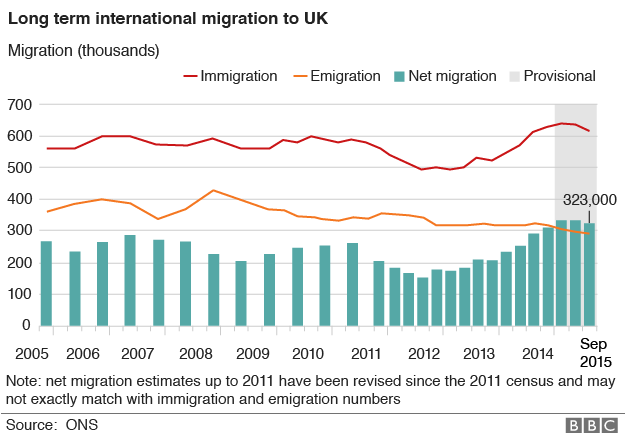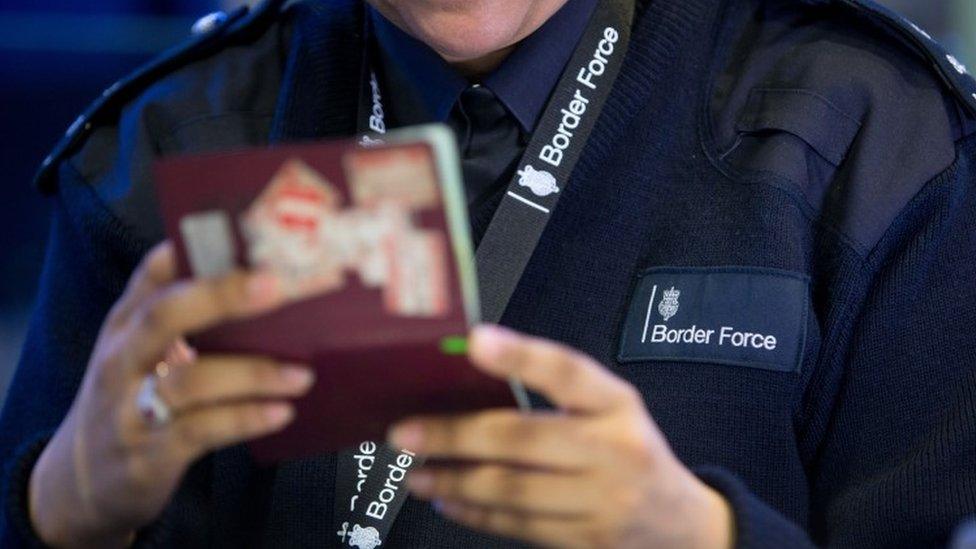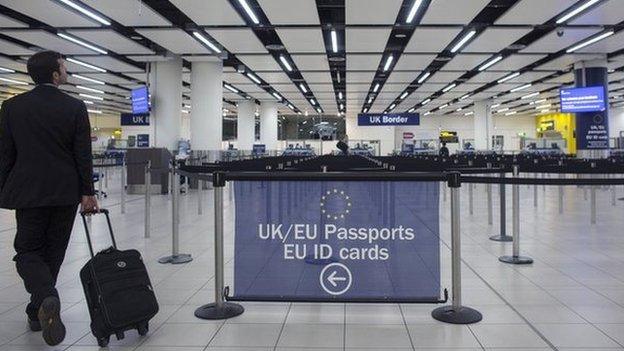NI numbers prompt row over 1.2m EU 'immigration gap'
- Published

Campaigners say official figures don't show the full impact of migration on the UK economy
Figures show 1.2m more EU migrants have got National Insurance numbers in the past five years than have shown up in immigration statistics.
Minister James Brokenshire said the gap could "largely be accounted for by short-term EU migration to the UK".
But Tory MP and EU Leave campaigner John Redwood said the NI numbers were "closer to the truth" on immigration.
And he warned the difference between the two figures had "really big implications" for public services.
Short-term migration - where people stay in the UK for less than a year - is not taken into account in the government's headline net migration statistics.
But former work and pensions secretary Iain Duncan Smith said "you can't dismiss" it.
"They come in, they do hotbedding in bed and breakfasts and things like that, they then take jobs at much lower rates," he told the BBC News channel.
"This has forced the salaries of people in low-skilled and semi-skilled jobs down so they have suffered directly as a result of uncontrolled borders with short-term migration.
"I'm astonished that a government, my government, can sit here and say we had a pledge to bring down migration to tens of thousands but it's all right then because it doesn't matter how many people come in as long as they don't stay more than 52 weeks."
Mr Duncan Smith and others campaigning to leave the EU argue the UK cannot control levels of migration from Europe - which have risen sharply in the past decade - while remaining a member and abiding by the EU's rules on the free movement of people.
Immigration minister James Brokenshire told MPs the government remained committed to getting net migration - the difference between those entering and leaving the country - below 100,000 a year.
He said the curbs secured by Prime Minister David Cameron on welfare payments to new arrivals would help - and he claimed short-term migrants do not put pressure on public services because they leave after a year.
Resignation call
The minister said: "National Insurance numbers can be obtained by anyone working in the UK for just a few weeks and the ONS explains clearly why the number of National Insurance registrations should not be compared with migration figures, because they measure entirely different things.
"Short-term migrants have never been included in the long-term migration statistics which are governed by UN definitions.
"We have always had short-term migrants who do not get picked up in the long-term statistics but short-term migration will not have an impact on population growth and population pressures, as they by definition leave the UK within 12 months arriving."
BBC Assistant Political Editor Norman Smith said "there is a real row brewing" over the figures and one pro-Leave Tory MP had told him "the letters demanding Mr Cameron's resignation were already going in to the chairman of the 1922 Committee" - the powerful committee of backbench Tory MPs.
HM Revenue and Customs have, meanwhile, released estimates that recently arrived EU immigrants have contributed more than five times more in tax than they have received in benefits.
The analysis looked at the contributions made by workers from the European Economic Area, the 28 EU member states plus Iceland, Lichtenstein and Norway, who had come to the UK between 2010 and 2014.
According to the HMRC, this group of migrants paid £3.1bn in income tax and National Insurance in the tax year to April 2014. At the same time, they claimed £556m in benefits - making a net contribution to the economy of more than £2.5bn.
Norman Smith said the figures were certain to be seized on by supporters of the Remain campaign to counter claims of "benefit tourism" and warnings by Brexit campaigners about the cost of immigration.

National Insurance numbers
Almost every adult resident in the UK is given a unique code, made up of letters and numbers, that they keep for life. People born in Britain are allocated a National Insurance shortly before their 16th birthday.
It is meant to ensure tax and National Insurance contributions are properly recorded against their name. It also enables access to the social security system.
Everyone coming to the UK to work must apply for a National Insurance number.

The ONS says the International Passenger Survey, a questionnaire given to people at random as they arrive at air and sea ports, which asks people how long they intend to stay, remains the best way of estimating immigration.
Its newly-published analysis, external examined differences between the estimates of long-term international migration to Britain and the registration of National Insurance numbers to foreign nationals.
The analysis suggests there were 1,004,000 "long-term" migrants to the UK from the EU between June 2011 and June 2015.
But other figures for the same period show 2,234,000 National Insurance numbers were allocated to EU nationals - a gap of 1.2 million.
When short-term migration is factored in the gap is much smaller, and is in fact higher in some years, although the full data is not available for the period.
The ONS analysis says there has been a sizeable gap between the passenger survey estimates for long-term immigration and the National Insurance figures since 2006.
"This difference is likely to reflect visitors who may be in the country for less than one month who may need a NI number to work or use the opportunity to apply for one," it says.
"It may also reflect those short-term migrants that come to accompany and join relatives and friends."

The number of National Insurance numbers issued to Bulgarians and Romanians has jumped from below 50,000 to more than 200,000 since work restrictions on people from those countries were lifted in 2014.
The ONS said it did not have enough data to understand whether this was being driven by short-term migration and some of the increase might be accounted for Bulgarian and Romanian citizens already in the UK applying for NI numbers, and some people might change their mind about how long they planned to stay.
The "actual" short term migration figure from the passenger survey for this period will not be published until 2017, it said.
Economist Jonathan Portes - who first requested the information - said it was clear a rise in short-term migration was a big factor but the statistics have still "under-counted EU migration to the UK".
"The government have finally published some of its figures, which they have been keeping concealed for a while," he told the BBC News channel.
The figures shed more light on immigration in the UK, he added, but they were still based on "imperfect" estimates because "we don't count people in and out of the country".
- Published30 December 2020

- Published25 February 2016

- Published27 January 2016
